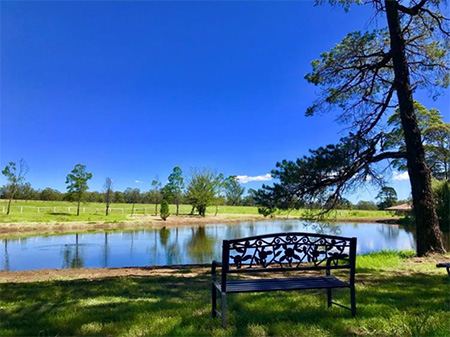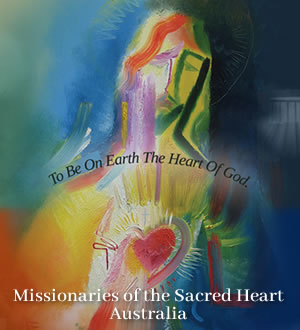 “Do not let your hearts be troubled” (John 14:1).
“Do not let your hearts be troubled” (John 14:1).
As we come to today’s reflection, we find ourselves in a different place to that of several weeks ago. Perhaps this week provides the opportunity to reflect on our reactions to the global spread of the Covid 19 virus. As cases were diagnosed in Australia and the spread of the virus was rampant in Italy and Spain, what were your reactions? Were you among the panic buyers? Were you, perhaps, in denial or resistance thinking the virus would go away and not affect your life? Did you withdraw with a strong urge for self- protection? Were you moved to take the millions, far more greatly affected than we have been in Australia, into your prayer?
As the time of isolation became a way of life, perhaps this helped you to be present to the moment, accepting the vulnerability bought by the pandemic, and being more open to God’s action in your life? Perhaps you have been drawn to be more prayerful, as well as taking the opportunity to reflect on what this time of upheaval could mean for you, our Australian society and our world? The present continues to be full of uncertainty as we look at mitigating restrictions, after having gained some control over the spread of the virus. The past (the way things used to be) may never return. One would hope, in many respects, that it will not. Perhaps, we will learn to live more simply, be more contemplative, and more mindful of the needs of others – those on the front line, those who are weighed down by financial hardship and our suffering brothers and sisters throughout the world.
In whatever situation we find ourselves Jesus’ words to the disciples, in Sunday’s gospel, are relevant. “Do not let your hearts be troubled” (John 14:1). In verse 27 of the same chapter Jesus says, “Peace I leave with you; my peace I give you. I do not give to you as the world gives” (John 14:27).
The peace that the world gives is nothing like the peace of Jesus. The former is often conditioned by circumstances, and illusory. It comes and goes and can be without any grounding in what is real. Jesus’ peace, on the other hand, is grounded in his awareness of being beloved by the Father. The love bond he shared with the Father was the source from which Jesus lived. Everything in Jesus’ life flowed from his relationship with the Father. The peace of Jesus also arose from his constant search to do always what pleased his Father: “My food is to do the will of him who sent me and finish his work” (John 4:34). It was the truth of his being and life, of the continual love of the Father and living in this love that enabled Jesus to bring life to so many. It was this that enabled him to love to the end, that we might be drawn to share in the same communion with God that Jesus shared.
As Jesus was not spared crises, difficulty, disappointment, and persecution neither are we. We know Jesus is with us in everything. There is, moreover, no doubt of reality of our life in God: no matter the circumstances, we are held in and supported by the infinite tenderness of God’s unconditional love. Indeed, from the beginning of time we have been secure in this love. Each of us has been in the heart and mind of God from all eternity. “God has never not known who we are eternally, who God eternally contemplates us to be” (James Finley, “Turning to the Mystics: Thomas Merton,” Podcast Session 4). In the words of Julian of Norwich: “We were treasured and hidden in God, known and loved from without beginning … [God] wants us to know that [our] soul was preciously knitted to him in its making, by a knot so subtle and so mighty that it is united in God” (“Julian of Norwich Showings,” translated by College and Walsh, Chapter 53). We are of God, from God and for God in whom we live and move and have our being (Acts 17:28). As we awaken to this truth of our being and blessedness together with the love that is continually giving itself to us, we can say “Yes” and open ourselves to the love that is constantly being offered to each of us.
Could it be that during these remaining weeks of the Easter Season, and as we live ‘new’ lives, we are being invited to live in greater awareness of the truth of who we are and the all-pervading presence, infinite tenderness and self-giving love of God in which we are held and supported? Perhaps, also, we are being invited, through this awareness, to live more deeply in and from the bond of love into which Jesus draws us? In so doing, we are enabled to live more deeply in the peace Jesus gives us, a peace which comes from the truth of who each of us is as the Beloved of God?
Ultimately, we are called to live more fully aware of God’s love and presence in our lives – the now and not yet of eternity. It is only then, and with God’s grace, that we can live more deeply from the life we share in God and in self-giving love as Jesus did. Such love, after all, is not our love but God’s love. Let us pray for this grace during the coming weeks. Then, also, we will become Christ’s transforming presence to our brothers and sisters with whom we will discover we are in profound solidarity.
Pauline Compton fdnsc
From the book of Henri J. M. Nouwen, Life of the Beloved.
I believe deeply that all the good things our world has to offer are yours to enjoy. But you can enjoy them truly only when you can acknowledge them as affirmations of the truth that you are the Beloved of God. That truth will set you free to receive the beauty of nature and culture in gratitude, as a sign of your Belovedness. That truth will allow you to receive the gifts you receive from your society and celebrate life. But that truth will also allow you to let go of what distracts you, confuses you and puts in jeopardy the life of the Spirit within you.
Think of yourself as having been sent into the world … a way of seeing yourself that is possible if you truly believe that you were loved before the world began … a perception of yourself that calls for a true leap of faith! As long as you live in the world, yielding to its enormous pressures to prove to yourself and to others that you are somebody and knowing from the beginning that you will lose in the end, your life can be scarcely more than a long struggle for survival. If, however, you really want to live in the world, you cannot look to the world itself as the source of life. The world and its strategies may help you to survive for a long time, but they cannot help you live because the world is not the source even of its own life, let alone yours.
Spiritually you do not belong to the world. And this is precisely why you are sent into the world. Your family and your friends, your colleagues, and your competitors and all the people you may meet on your journey through life are all searching for more than survival. Your presence among them as the one who is sent will allow them to catch a glimpse of the real life.
Everything changes radically from the moment you know yourself as being sent into this world. Times and spaces, people and events, art and literature, history and science, they all cease to be opaque and become transparent, pointing far beyond themselves to the place from where you come and to where you will return. It is very hard for me to explain to you this radical change because it is a change that cannot be described in ordinary terms; nor can it be taught or practised as a new discipline of self-knowledge. The change of which I speak is the change from living life as a painful test to prove that you deserve to be loved, to living it as an unceasing ‘Yes’ to the truth of that Belovedness. Put simply, life is a God given opportunity to become who we are, to affirm our own true spiritual nature, claim our truth, appropriate and integrate the reality of our being, but, most of all to say “Yes” to the One who calls us the Beloved.



